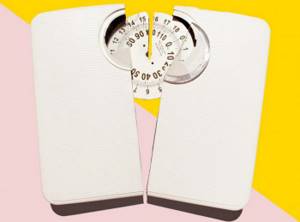Is weighing harmful?
Go to workouts, maintain a healthy lifestyle, eat right, be happy and healthy. It sounds great, but it seems like the constant urge to diet and lose weight is something that plagues a lot of people today. The result is constant pressure and expectations that people place on themselves.
And with the constant desire to lose weight, we go on diets and weigh ourselves regularly. For many people, the idea of weighing itself is difficult, scary, stressful, but it's something that needs to be done.
However, the general idea that you should weigh yourself is more harmful than helpful. In fact, the occasional benefit from the result of this process is sharply canceled out by the negative aspects.
Here are good reasons why you should stop weighing yourself.
Set short-term goals
Short-term goals are undeniable helpers in the long-term process of losing weight. The decision you made to “lose” 10 kg in a week is initially doomed to failure. But what's stopping you from setting another goal - wearing clothes one or two sizes smaller for a certain holiday? You can even buy your favorite dress or suit for the upcoming celebration, a size smaller than yours. Don't forget that in reality you can lose 2-3 kg per month.
So, mentally you have created a new figure. Get used to it and accustom yourself to it, and, of course, remember about the new purchase when your hand reaches for the next bun or pie. The right psychological attitude, exercise and a balanced diet will help you achieve your dream figure. Set only realistic goals and set only realistic dates!
Article on the topic
We are losing weight little by little. How aromatic oils help in weight loss
This is the trigger
Just like being pointed out about problem areas on your body or being insulted about your appearance, weighing yourself can be an equally unpleasant experience. Naturally, since people are shy for many reasons, they will try to avoid negative situations or moments where their shortcomings are pointed out.
Making a beautiful woven rug for your home: instructions clear for beginners
Natural Leaders: People born in January have 10 special qualities
More green and healthy: architecture and interior design trends in 2021
Once you step on the scale, you will see numbers that make you feel satisfied or give you important information about your health. But most likely, after weighing you will be in a bad mood.
This number is too powerful and can trigger an eating disorder. Keep in mind that weighing yourself is not only something to celebrate, but it is also a harsh reality for many people. Most often, people who constantly weigh themselves become depressed. In short, the numbers on the meter can make you feel terrible.
Weighing yourself is a trigger that causes a vicious cycle. This cycle can lead to more intense dieting, lack of self-confidence, depression, etc.

When and how often should you weigh yourself?
You should weigh yourself often if you have diarrhea, if you are constantly losing weight, if you are pregnant, or if you are actively involved in sports; this helps control muscle gain. In inflammatory chronic diseases, daily weighing may not bring results. When losing weight, it is recommended to measure your body weight in the morning, before meals and after hygiene procedures. Every day the body can be exposed to many factors, such as eating unhealthy salty foods, hormonal changes, so weight assessment should be carried out over two weeks, measured once every 7 days.
This is not a doctor
Scales are a device that gives you only one piece of information and cannot take into account other indicators. All it does is show your weight in numbers.
The device does not take into account when you had your last meal, how much water or liquid you drank, what time of day, what you are wearing, your height, age, gender and much more.
There are many different factors that affect weight. The device you trust will not be able to point out your problems. And you can’t either, because you are not a doctor. This enchanted number on the scales prevents you from living a normal life. In order not to torment yourself and others, it is best to seek help from a doctor. He will easily sort everything out for you and point out health problems that affect your weight.
Flowers are not worn to Jewish graves, but why are there so many stones on them: tradition
The beloved Ichthyander has passed away... The main woman in the life of Vladimir Korenev
Gemini - an emerald. We select lucky stones according to zodiac signs for 2021

Use the scale correctly
It is recommended to install the scale on a firm, level surface. Avoid placing the scale on carpet or uneven floors as this will not provide an accurate measurement.
The person should stand with both feet in the center of the scale and remain motionless while weighing.
The scales should be calibrated. This means that the scale should read zero when it is turned on and no one will be standing on it.
To get the most accurate results, it is important to use only one scale. Even if the calibration is inaccurate, by using the same scale over and over again, a person can accurately track changes in their weight. If other scales are used, any changes in measurement may not give a true indication of weight change.
A person should avoid weighing themselves in gyms, health clubs and other fitness centers. While scales can be accurate, there are other variables that are difficult to control, such as time of day, activity level, and clothing choices. Even if a person calibrates the equipment, it may not always be accurate in measuring weight. A 2017 study using scales at 27 pediatric medical clinics found that only 16 of 152 scales were 100% accurate. However, by using the same scale, a person should still be able to track changes in weight over time.
In the morning or evening?
It is better to weigh yourself in the morning for one simple reason - this is the only time of day when you are in approximately the same conditions every day, or, more precisely, in comparable conditions.
During the day, various metamorphoses may occur to you: you overate, you didn’t eat enough, you sweated (or didn’t drink for several hours) and lost a lot of water through sweat (breathing) and other things. At night, all this comes to approximately the same denominator, unless, of course, you spend the night hugging the refrigerator)))
And to make the conditions even more similar, weigh yourself in the morning after visiting the toilet and bowel movements.
Lose weight to be happy
Of course, there are cases when even the most absurd relationship with scales does not interfere with staying slim. In my practice, there were a mother and daughter who for years weighed themselves 2 and sometimes 3 times a day... And not only when they wanted to lose weight, but also at ordinary times.
At the same time, when they found themselves outside the house at the appointed time for weighing, they began to get nervous, feel discomfort and could no longer think about anything except that they had missed their date with the scales... Can you imagine what kind of life it is when any absence from at home without scales (!) threatens constant stress?..
And it doesn’t even matter whether they remained thin or fat. Because this scheme for tracking weight loss results is suitable only for those who are ready to voluntarily replace obesity with neurasthenia. Most of us want to lose weight in order to be happy, and not unhappy, like these two poor ladies.
Be patient
What to do if both your waist and weight have not changed in a week? Do not panic! Firstly, the body does not like to lose weight. This is fat for you - a source of dissatisfaction with the reflection in the mirror, and for him - a stash in case of hunger. And you know, no one likes to take something out of their stash. And he tries his best not to do this. So wait another week. And if even then the process does not move in the right direction, then there is a reason to make adjustments to nutrition and physical activity.
In general, don't rush. You haven’t been getting fat for a month or a year, so give your body time to remember what it’s like to be beautiful and fit again.”
What is the danger
How does this happen in practice? A person bravely overcomes all the temptations of the world gastronomic backstage all day long, and instead of relaxing in the evening watching TV, he sweats in the gym. In the morning he gets on the scales, expecting a reward of “minus 300 grams”, and then there’s a plus! The next shot is “screw it all, there’s no point anyway!” - a forced march to the refrigerator with the destruction of everything that is not nailed down. The second option for the development of events is to “cut” the daily calorie intake even more, in especially severe cases, go on fasting-kefir diets or some other fashionable obscurantism from the pages of Instagram (they won’t lie there!)
In both cases, nothing good, of course, happens. And these unfortunate scales are to blame for showing an increase. Although, provided that only two factors are observed - a reasonable diet and adequate physical activity - the process of burning fat goes on as usual. And it does not always directly correlate with the readings on the scales. In just a day, weight can change by kg or even more. There are many reasons - shifts in the water-salt balance (we ate salted fish at night), muscle swelling after high-impact strength training, changes in hormonal levels, which is especially important for women.

Photo: istockphoto.com
Common mistakes
- The biggest mistake is weighing yourself every day, because body weight can constantly change, even if a person follows a strict diet, the weight fluctuates in hundreds of milligrams. There are also other common mistakes.
- Check weight on other scales. They may show a different result. The at-home procedure provides the most accurate results if measurements are taken correctly.
- Using inexpensive scales. The less the device costs, the greater the likelihood of incorrect indicators.
- Measurement immediately after eating. Food does not have time to be digested throughout the day, so the readings will not be correct until the morning.
- Weighing in clothes. The procedure should be carried out only in underwear.
- Placing the scale on the wrong surface. If the scales were installed on a carpet, the pile may absorb the weight and therefore incorrect data will be obtained, the discrepancy will be from 2 to 3 kg.
- Movements on the scales. When the body is tilted or tilted, the indicators may change; this action applies to mechanical and electronic scales.
- Checking during menstruation. During this time, a large amount of fluid accumulates in the body, and body weight may increase.
- Weighing after physical activity. During sports, a large amount of fluid is lost.
- Control during illness. As the temperature rises, appetite decreases and this may not be reflected correctly on the scale.
How to weigh yourself correctly
The rules must be followed depending on the device used. The most accurate result is shown by mechanical scales, but the measurement result can be influenced by temperature and many other factors, and they are also susceptible to vibration.
On mechanical scales
- To ensure your weight is correct, you should measure it in the same clothes.
- The appliance must be placed on a hard, straight surface. If there are deviations in the surface, the floor scale may show an incorrect result, so the scale must be kept in the same place.
- The feet on the device should be the same at the same distance from zero.
- You need to get up quickly and with both feet, so that the indicators do not change, you should not lean forward and backward.
- If the scales always show different indicators, this may indicate a breakdown of the device. Also, such a result can be said about non-compliance with weighing conditions or due to other factors.
On electronic scales
The weighing rules are similar to mechanical ones, but there are other features.
- Floor scales must be installed at a distance of at least 80 cm from various household appliances such as refrigerators, stoves and other devices.
- Weighings should be carried out with bare feet, because some instruments have sensors that react to bare feet.
- On some devices, you should follow certain instructions and wait until 0 appears on the screen.
- If the device begins to show significant differences in performance, the batteries on the device should be changed.
- Electrical devices also measure weight incorrectly if the room is cold.










